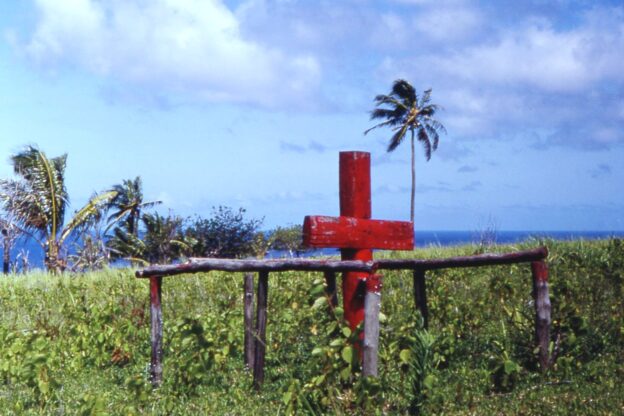By Paul-François Tremlett – part of our series on Black History Month.
As part of the Open University’s events marking Black History Month I gave a short lecture examining textual and visual representations of Melanesian Cargo Cults, to highlight how the production of knowledge about Cargo Cults by anthropologists and others was sealed off from overlapping contexts of colonialism, capitalism and racism. The lecture focused on Francis Edgar Williams’ ethnographic account of the so-called Valaila Madness (1923) and David Attenborough’s representation of the followers of John Frum in the film, The People of Paradise: A Journey through the South Seas (1960). I suggested that these representations of Cargo cults were structured by a Western conception of rationality that, while abstractly premised upon the psychic unity of humankind in practice furthered the active denigration of black voices and experiences.
Such critiques in anthropology are not new: for example in 1973 Talal Asad in Anthropology and the Colonial Encounter – and 13 years later Renato Rosaldo in Writing Culture – insisted that attention be directed to the techniques through which anthropological and scientific knowledge has been separated and insulated from the colonial contexts in which it was produced. Importantly, they also advocated experimentation with new kinds of ethnographic writing that could accommodate “multicentric, dialogical perspective[s]” (Borofsky 2020, p. 2).
In tandem with the welcome advance of global south and decolonial epistemologies in anthropology, the field of Religious Studies has seen a shift in recent years away from essentialist and a-historical accounts of this or that World Religion (with a capital R) represented more or less as discrete and unitary systems of ideas and beliefs, to a focus on lived religions. The field has a complex, inter- and trans-disciplinary ancestry including anthropology, history, philology, philosophy, sociology and theology, yet epistemological debates about methods and theories have remained largely trapped within a series of over-lapping binary oppositions including reason : experience, insider : outsider, qualitative : quantitative and reductionist : phenomenological, that have helped sustain a range of problematic, Western assumptions such as the privileging of mind and Man over matter. The lived religions focus is decidedly about what people do rather than what they believe and it has brought to the fore voices, groups and communities that were silenced by the World Religion approach, but nevertheless it does little to challenge the hegemony of the meaning-endowing and rational-choice-making individual as the unit of analysis in the study of religions,
and is largely silent about post-humanist epistemologies and the contribution they can make to decolonising the field. Malory Nye has constructively exposed some of the blind spots in the teaching of Religious Studies, for example its habit of “celebrating diversity” while “not talking about race” (2020). Furthermore, informed by the work of Bruno Latour, Graham Harvey has stressed the importance of thinking religions in terms of “embodiment, materiality, and relationality” in order to “radically contest the privatization and interiorization of religion” (Harvey 2020: 144) that emerged under the hegemony of white, Protestant modernity. In a similar spirit and riffing from writings by Jane Bennett, Manuel DeLanda and Gilles Deleuze, I have suggested that the focus in Religious Studies should be the transformations of historically and culturally situated and stratified assemblages of religions, secularisms, technologies, states, spaces and economies (Tremlett 2020).
There is no quick fix to decolonising Religious Studies, no single, simple step to a decolonised curricula or pedagogy or research methods. But we do have skills of listening and learning through which the field can better reflect on itself as a mode of production for generating knowledge about religions and the wider world. Those skills need to be brought to bear both to experiment theoretically and methodologically in our research, in the design of curricula and in the development of teaching and assessment strategies.
Bibliography
Asad, Talal. 1973, ‘Introduction’ in Anthropology and the Colonial Encounter, (ed), Talal Asad, Atlantic Highlands, NJ: Humanities Press.
Barofsky, Rob. 2020, ‘Rethinking Ethnography: A Study in Public Anthropology’ in Anthropology Today 36 (5): 1-2.
Harvey, Graham. 2020, ‘Trans-Indigenous Festivals: Democracy and Emplacement’ in Ritual and Democracy: Protests, Publics and Performances, (eds), Sarah M. Pike, Jone Salomonsen and Paul-François Tremlett, Sheffield: Equinox.
Nye, Malory. 2020, ‘A Discussion of the ‘Religion and Worldviews in Religious Education’ Report: Critical Race Theory’ https://medium.com/@malorynye/religion-and-worldviews-in-religious-education 142c0007ce37
Rosaldo, Renato. 1986, ‘From the Door of his Tent: The Fieldwork and the Inquisitor’ in Writing Culture: The Poetics and Politics of Ethnography. (eds). James Clifford and George E. Marcus. Berkeley: University of California Press.
Tremlett, Paul-François. 2020, Towards a New Theory of Religion and Social Change: Sovereignties and Disruptions, Bloomsbury: London.
Williams, Francis, Edgar. 1977. ‘The Vailala Madness’ and Other Essays. Honolulu: The University Press of Hawaii.

